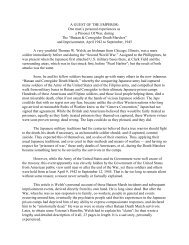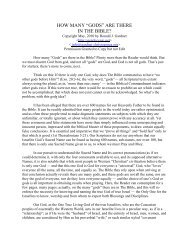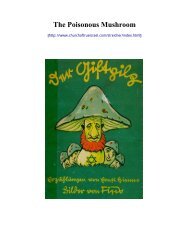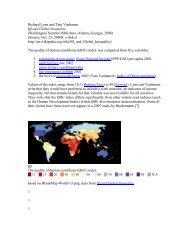The Protocols of the Learned Elders of Zion -- Book - A Gentle Cynic
The Protocols of the Learned Elders of Zion -- Book - A Gentle Cynic
The Protocols of the Learned Elders of Zion -- Book - A Gentle Cynic
You also want an ePaper? Increase the reach of your titles
YUMPU automatically turns print PDFs into web optimized ePapers that Google loves.
BOOK ONE — INTRODUCTION<br />
Part 17.<br />
WHO WROTE THE PROTOCOLS? 96/<br />
<strong>The</strong> Jews blame Pytor Ivanovich Rachkovsky, <strong>the</strong> chief <strong>of</strong> <strong>the</strong> Czar’s Okhrana, a secret<br />
police for <strong>the</strong> existence <strong>of</strong> <strong>The</strong> <strong>Protocols</strong>. <strong>The</strong>y suggest Rachkovsky, acting in <strong>the</strong> name <strong>of</strong> <strong>the</strong><br />
Czar, had an anti-semitic motive in doing it, because <strong>of</strong> <strong>the</strong> Russian Jewry’s revolution against<br />
<strong>the</strong> Czar. 97/ But <strong>the</strong> most likely author <strong>of</strong> <strong>The</strong> <strong>Protocols</strong> — or perhaps more correctly: <strong>the</strong><br />
speaker <strong>of</strong> <strong>the</strong>m, regardless <strong>of</strong> its title, would be <strong>The</strong>odor Herzl (1860-1904), considered “<strong>the</strong><br />
fa<strong>the</strong>r <strong>of</strong> political <strong>Zion</strong>ism and founder <strong>of</strong> World <strong>Zion</strong>ist Organization.” 98/ If not Herzl, <strong>the</strong>n a<br />
deep study <strong>of</strong> <strong>the</strong> men involved in early <strong>Zion</strong>ism would discover that person, for Herzl was<br />
surrounded by men <strong>of</strong> ambition; but all evidence as yet indicated it was Herzl himself who ei<strong>the</strong>r<br />
wrote, or at least spoke, those words written in <strong>The</strong> <strong>Protocols</strong> — <strong>The</strong> Minutes <strong>of</strong> <strong>the</strong> <strong>Zion</strong>ist<br />
meeting.<br />
<strong>The</strong> Speaker must have used some form <strong>of</strong> notes, to “stay on point;” and, such a length <strong>of</strong><br />
speech could not reasonably occur in one half-day or one whole day. In fact, a study <strong>of</strong> <strong>the</strong> Text<br />
indicates that <strong>the</strong> Speaker mentions at least two or more occasions where he begins <strong>the</strong> session<br />
on a different day and/or session, which was <strong>the</strong>reafter occupied with this matter. <strong>The</strong><br />
complexity, <strong>the</strong> detail, and <strong>the</strong> organized manner <strong>of</strong> presentation, all alludes to some written text,<br />
which, as is seen, could have been obtained by whatever means, and revealed to <strong>the</strong> world by<br />
one recognizing <strong>the</strong> dangers <strong>of</strong> what was spoken.<br />
Herzl was <strong>the</strong> holder <strong>of</strong> a doctorate in law and was a writer <strong>of</strong> plays and fiction, and a<br />
newspaper reporter, <strong>the</strong> Paris, France correspondent for <strong>the</strong> Neus Freie Presse <strong>of</strong> Vienna, from<br />
October, 1891 to July, 1895. He wrote his Work based upon a first draft <strong>of</strong> speeches and<br />
accumulated notes for Der Judenstaat (<strong>The</strong> Jewish State) — <strong>the</strong> establishment <strong>of</strong> a Jewish<br />
homeland, compiled in 1895; <strong>the</strong> speech was also known as an “Address to <strong>the</strong> Rothschilds,”<br />
and/or “To <strong>the</strong> Family Council.” 99/<br />
In his diary, Herzl described his Jewish State idea as “a work <strong>of</strong> infinite grandeur...a<br />
mighty dream....It is still too early to surmise what will come <strong>of</strong> it...If my conception is not<br />
translated into reality, at least my activity can become a novel. Title: <strong>The</strong> Promised Land! To<br />
tell <strong>the</strong> truth, I am no longer sure that it was not actually <strong>the</strong> novel I first had in mind...Perhaps<br />
96 WHO WROTE IT? A complete history <strong>of</strong> <strong>The</strong>odor Herzl and his relationship to “<strong>Zion</strong>ism”<br />
(and possibly as <strong>the</strong> one who spoke as written in <strong>The</strong> <strong>Protocols</strong> <strong>of</strong> <strong>Zion</strong>) can be found in <strong>the</strong><br />
respected Encyclopedia Judaica, Vol. 8, “Herzl, <strong>The</strong>odor,” from pp. 407-422. See also, Sources<br />
noted below. However, this Part could be better drawn, to focus more clearly and accurately<br />
upon <strong>The</strong>odor Herzl as <strong>the</strong> most likely author <strong>of</strong> <strong>The</strong> <strong>Protocols</strong> <strong>of</strong>...<strong>Zion</strong>. (Ed.).<br />
97 THE JEWS BLAME THE RUSSIAN SECRET POLICE. Levy, A Lie & a Libel, p. xi.<br />
98 THEODOR HERZL, FATHER OF ZIONISM. Encyclopedia Judaica, Vol. 8, pp 407. “I have<br />
said that <strong>the</strong> summoning <strong>of</strong> <strong>the</strong> Congress was <strong>the</strong> first constructive work (or, policy) attempted<br />
by Herzl, in 1897, says Richard J.H. Got<strong>the</strong>il, <strong>Zion</strong>ism, Chp. IV, “<strong>The</strong>odor Herzl, p. 93; and, id.,<br />
Chp. V, “<strong>The</strong> Jewish Congress,” at p. 108.<br />
99 FAMILY COUNCIL. <strong>The</strong> Reader should remember that <strong>the</strong> word “council” in English<br />
translates into “soviet” in Russian. See: Nolan, Communism versus <strong>the</strong> Negro, Chp. “Notes,” p.<br />
230 at n. 9).<br />
THE PROTOCOLS OF THE LEARNED ELDERS OF ZION Page -37-






